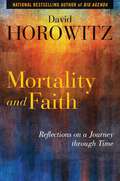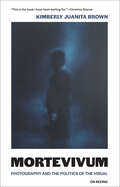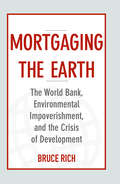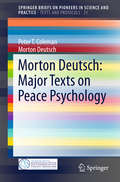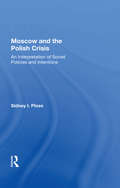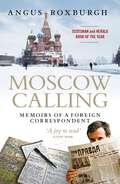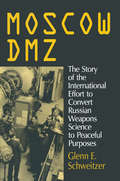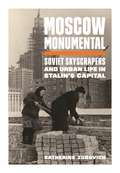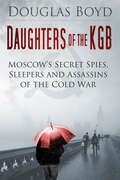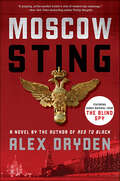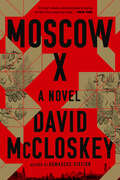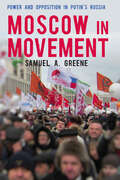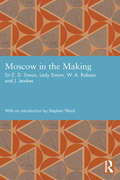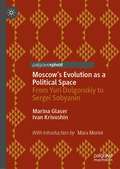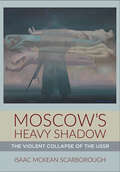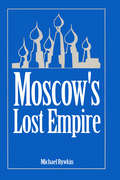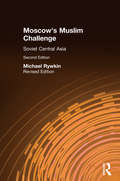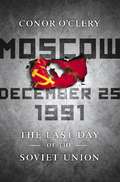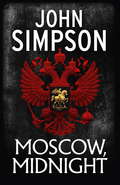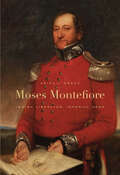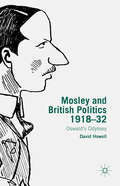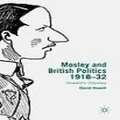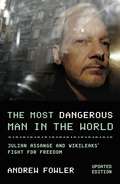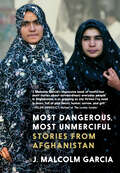- Table View
- List View
Mortality and Faith: Reflections on a Journey through Time
by David HorowitzMortality and Faith is the second half of an autobiography of David Horowitz whose first installment, Radical Son, was published more than twenty years ago. It completes the account of his life from where the first book left off to his seventy-eighth year. In contrast to Radical Son whose focus was his political odyssey, Mortality and Faith was conceived as a meditation on age, and on our common progress towards an end which is both final and opaque. These primal facts affect all we see and do, and force us to answer the questions as to why we are here and where we are going with conjectures that can only be taken on faith. Consequently, an equally important theme of this work is its exploration of the beliefs we embrace to answer these questions, and how the answers impact our lives.
Mortevivum: Photography and the Politics of the Visual (On Seeing)
by Kimberly Juanita BrownA powerful examination of the unsettling history of photography and its fraught relationship to global antiblackness.Since photography&’s invention, black life has been presented as fraught, short, agonizingly filled with violence, and indifferent to intervention: living death—mortevivum—in a series of still frames that refuse a complex humanity. In Mortevivum, Kimberly Juanita Brown shows us how the visual logic of documentary photography and the cultural legacy of empire have come together to produce the understanding that blackness and suffering—and death—are inextricable. Brown traces this idea from the earliest images of the enslaved to the latest newspaper photographs of black bodies, from the United States and South Africa to Haiti and Rwanda, documenting the enduring, pernicious connection between photography and a global history of antiblackness.Photography's history, inextricably linked to colonialism and white supremacy, is a catalog of othering, surveillance, and the violence of objectification. In the genocide in Rwanda, for instance, photographs after the fact tell viewers that blackness comes with a corresponding violence that no human intervention can abate. In Haiti, the first black republic in the Western Hemisphere, photographic &“evidence&” of its sovereign failure suggests that the formerly enslaved cannot overthrow their masters and survive to tell the tale. And in South Africa and the United States, a loop of racial violence reminds black subjects of their lower-class status mandated via the state. Illustrating the global nature of antiblackness that pervades photographic archives of the present and the past, Mortevivum reveals how we live in a repetition of imagery signaling who lives and who dies on a gelatin silver print—on a page in a book, on the cover of newspaper, and in the memory of millions.The URL for this publication is https://on-seeing-mortevivum.org/.
Mortgaging the Earth
by Bruce RichThe 1992 Rio Earth Summit was supposed to be a turning point for the World Bank. Environmental concerns would now play a major role in its lending--programs and projects would go beyond economic development to "sustainable development. " More than two decades later, efforts to green the bank seem pallid. Bruce Rich argues that the Bank's current institutional problems are extensions of flaws that had been present since its founding. His new book, Foreclosing the Future, tells the story of the Bank from the Rio Earth Summit to today. For readers who want the full history of the Bank's environmental record, Rich's acclaimed 1994 critique, Mortgaging the Earth, is an essential companion. Called a "detailed and thought-provoking look at an important subject" by The New York Times, Mortgaging the Earth analyzes the twenty year period leading up the Rio Summit. Rich offers not only an important history but critical insights about economic development that are ever-more relevant today.
Morton Deutsch: Major Texts on Peace Psychology
by Peter T. Coleman Morton DeutschCommemorating Morton Deutsch's 95th birthday, this book presents ten major texts by this highly respected social psychologist on war and peace. This second volume presents Deutsch in his role as a leading social science activist on issues of war and peace - writing papers, making speeches and participating in demonstrations. After serving in the U. S. Air Force during World War II and being awarded two Distinguished Flying Cross medals, as a psychologist he was determined to work for a more peaceful world. Influenced by Kurt Lewin, who believed that nothing was as practical as a good theory, Deutsch pursued theoretical work on such issues as cooperation-competition, conflict resolution and social justice with regard to issues of war and peace. As President of the Society for the Study of Peace, Conflict and Violence, the Society for the Psychological Study of Social Issues and the International Society of Political Psychology, he helped to foster social science efforts to make for a more peaceful world.
Moscow And The Polish Crisis: An Interpretation Of Soviet Policies And Intentions
by Sidney I. PlossDuring the Polish crisis of 1980-1981, the Western world was uncertain of the Soviet response to turmoil in Poland, and speculation about an invasion was rife. The timing of the Polish declaration of martial law came "without forewarning to the United States, according to then Secretary of State Alexander M. Haig, Jr. In retrospect, Dr. Ploss point
Moscow Calling: Memoirs of a Foreign Correspondent
by Angus RoxburghA British journalist offers an intimate view of Russia from the Cold War to the rise of Putin through his personal experiences as a correspondent. In the course of the past 45 years, Angus Roxburgh has translated Tolstoy, met four successive Russian presidents and been jinxed by a Siberian shaman. He has come under fire in war zones and been arrested by Chechen thugs. During the Cold War he was wooed by the KGB, who then decided he would make a lousy spy and expelled him from the country. In Moscow Calling, Roxburgh presents his Russia: not the Russia of news reports, but a quirky, exasperating, beautiful, tumultuous world that in four decades has changed completely—and not at all. Roxburgh narrates an incredible journey from the dark, fearful days of communism and his adventures as a correspondent covering the Soviet Union&’s collapse to his frustrating work as a media consultant to Putin&’s Kremlin. His memoir offers a unique, fascinating and at times hilarious insight into a country that today, more than ever, is of global political significance.
Moscow DMZ: The Story of the International Effort to Convert Russian Weapons Science to Peaceful Purposes
by Glenn E. SchweitzerAs the Soviet Union was collapsing in late 1991, reports began to reach the West about agents "shopping" for weapons systems - and weapons scientists - in the beleaguered Soviet military-industrial complex. In response, the United States, the European Community, and Japan, in cooperation with the Russian government, created a program to reemploy Soviet scientific personnel in civilian projects dealing with the legacy of the Soviet system - a polluted environment, unsafe nuclear power facilities, and economic underdevelopment. In this fascinating first-person account, the American environmental scientist who led the effort to establish the International Science and Technology Center in Moscow tells the diplomatic, scientific, and human story behind a remarkable post-Cold War conversion initiative.
Moscow Monumental: Soviet Skyscrapers and Urban Life in Stalin's Capital
by Katherine ZubovichAn in-depth history of the Stalinist skyscraperIn the early years of the Cold War, the skyline of Moscow was forever transformed by a citywide skyscraper building project. As the steel girders of the monumental towers went up, the centuries-old metropolis was reinvented to embody the greatness of Stalinist society. Moscow Monumental explores how the quintessential architectural works of the late Stalin era fundamentally reshaped daily life in the Soviet capital.Drawing on a wealth of original archival research, Katherine Zubovich examines the decisions and actions of Soviet elites—from top leaders to master architects—and describes the experiences of ordinary Muscovites who found their lives uprooted by the ambitious skyscraper project. She shows how the Stalin-era quest for monumentalism was rooted in the Soviet Union's engagement with Western trends in architecture and planning, and how the skyscrapers required the creation of a vast and complex infrastructure. As laborers flooded into the city, authorities evicted and rehoused tens of thousands of city residents living on the plots selected for development. When completed in the mid-1950s, these seven ornate neoclassical buildings served as elite apartment complexes, luxury hotels, and ministry and university headquarters.Moscow Monumental tells a story that is both local and broadly transnational, taking readers from the streets of interwar Moscow and New York to the marble-clad halls of the bombastic postwar structures that continue to define the Russian capital today.
Moscow Rules: Secret Police, Spies, Sleepers, Assassins (Espionage)
by Douglas BoydAfter the guns fell silent in May 1945, the USSR resumed its clandestine warfare against the western democracies. Stalin installed secret police services in the satellite countries of Central and Eastern Europe. Trained by his NKVD officers of the Polish UB, the Czech StB, the Hungarian AVO, Romania’s Securitate, Bulgaria’s KDS, Albania’s Sigurimi and the Stasi of the German Democratic Republic spied on and ruthlessly repressed their fellow citizens on the Soviet model. When the resultant hatred exploded in uprisings they were put down by brutality, bloodshed and Soviet tanks. Not so obvious was that these state terror organisations were also designed for military and commercial espionage in the West, to conceal the real case officers in Moscow. Specially trained operatives undertook ‘wet jobs’, including the assassinations. Perhaps the most menacing were the sleepers who who married and raised families in the west while waiting to strike against their host countries; many are still among us.In Moscow Rules Douglas Boyd explores the relationship between the KGB and its ghastly brood – a family from hell.
Moscow Sting: A Novel (Anna Rensikov Ser. #2)
by Alex Dryden“Alex Dryden is a writer who can please everyone from fans of old LeCarré to students of current affairs. Moscow Sting is a thought-provoking and entertaining follow up to the terrific Red to Black.”—James Grippando, New York Times bestselling author of Afraid of the DarkBooklist places author Alex Dryden in “the top rank of espionage novelists.” His riveting Moscow Sting proves that the resounding critical acclaim awarded him for his debut, Red to Black, was no fluke. In this spellbinding sequel, former KGB colonel Anna Resnikov escapes to America where she must outwit CIA “friend” and KGB foe alike to survive. Alex Dryden has brought breathtaking new life to the spy novel in this blistering “ripped from the headlines” thriller that focuses on Russia’s chilling reemergence as a hostile superpower.
Moscow X: A Novel
by David McCloskey“A smart, sleek, and absolutely gripping thriller that swept me away.” —Brad Thor A daring CIA operation threatens chaos in the Kremlin. But can Langley trust the Russian at its center? CIA officers Sia and Max enter Russia under commercial cover to recruit Vladimir Putin’s moneyman. Sia works for a London law firm that conceals the wealth of the superrich. Max’s family business in Mexico—a CIA front since the 1960s—is a farm that breeds high-end racehorses. They pose as a couple to target Vadim, Putin’s private banker, and his wife, Anna, who—unbeknownst to CIA—is a Russian intelligence officer under deep cover at the bank. As they descend further into a Russian world dripping with luxury and rife with gangland violence, Sia and Max’s only hope may be Anna, who is playing a game of her own. Careening between the horse ranch in northern Mexico, the corridors of Langley, and the dark opulence of Putin’s Russia, Moscow X is both a gripping thriller of modern espionage and a raw, unsparing commentary on the nature of truth, loyalty, and vengeance amid the shadow war between the United States and Russia.
Moscow in Movement: Power and Opposition in Putin's Russia
by Samuel A. GreeneMoscow in Movement is the first exhaustive study of social movements, protest, and the state-society relationship in Vladimir Putin's Russia. Beginning in 2005 and running through the summer of 2013, the book traces the evolution of the relationship between citizens and their state through a series of in-depth case studies, explaining how Russians mobilized to defend human and civil rights, the environment, and individual and group interests: a process that culminated in the dramatic election protests of 2011–2012 and their aftermath. To understand where this surprising mobilization came from, and what it might mean for Russia's political future, the author looks beyond blanket arguments about the impact of low levels of trust, the weight of the Soviet legacy, or authoritarian repression, and finds an active and boisterous citizenry that nevertheless struggles to gain traction against a ruling elite that would prefer to ignore them. On a broader level, the core argument of this volume is that political elites, by structuring the political arena, exert a decisive influence on the patterns of collective behavior that make up civil society—and the author seeks to test this theory by applying it to observable facts in historical and comparative perspective. Moscow in Movement will be of interest to anyone looking for a bottom-up, citizens' eye view of recent Russian history, and especially to scholars and students of contemporary Russian politics and society, comparative politics, and sociology.
Moscow in the Making (Studies in International Planning History)
by Ernest Simon Shena Simon W. A. Robson J. JewkesThis book, published in 1937, reported on a four week visit to Moscow in 1936 to study the making of Moscow as a showpiece Soviet capital. At its core was the 1935 General Plan for the Reconstruction of Moscow but the book was a study of planning in the Soviet rather than the Western sense. Thus it covered many aspects of the city’s social and economic life including industry and finance, education and housing production as well as governance and town planning. Much first hand detail is included, based on the visit and the authors’ meetings with Soviet officials and citizens that illustrate various points, usually in praise. The book made a significant contribution towards the growing arguments in 1930s Britain and other parts of the Anglophone world for a bolder, more comprehensive and more state-led approach to planning. In turn these arguments had an important impact in shaping the policies adopted in the 1940s.
Moscow's Evolution as a Political Space: From Yuri Dolgorukiy to Sergei Sobyanin
by Marina Glaser Ivan KrivushinThe book aims to trace and explain the historical evolution of Moscow, the capital of the Tsardom of Russia, Soviet Union and Russian Federation, as a political entity and political community, and to understand what place Moscow occupied within the Russian political space and what role it played in Russian political life for centuries until 2018. The authors consistently examine the dramatic political history of the contemporary Russian capital in the Moscow (13th – 17th centuries) and St. Petersburg (18th – 19th centuries) epochs, in the Soviet period, in the post-Soviet era, and identify its key points and the most pivotal events.
Moscow's Heavy Shadow: The Violent Collapse of the USSR
by Isaac McKean ScarboroughMoscow's Heavy Shadow tells the story of the collapse of the USSR from the perspective of the many millions of Soviet citizens who experienced it as a period of abjection and violence. Mikhail Gorbachev and the leaders of the USSR saw the years of reform preceding the collapse as opportunities for rebuilding (perestroika), rejuvenation, and openness (glasnost). For those in provincial cities across the Soviet Union, however, these reforms led to rapid change, economic collapse, and violence.Focusing on Dushanbe, Tajikistan, Isaac McKean Scarborough describes how this city experienced skyrocketing unemployment, a depleted budget, and streets filled with angry young men unable to support their families. Tajikistan was left without financial or military resources, unable and unprepared to stand against the wave of populist politicians of all stripes who took advantage of the economic collapse and social discontent to try to gain power. By May 1992, political conflict became violent and bloody and engulfed the whole of Tajikistan in war. Moscow's Heavy Shadow tells the story of how this war came to be, and how it was grounded in the reform and collapse of the Soviet economy that came before.
Moscow's Lost Empire
by Michael RywkinThis volume gives an overview of the regional, ethnic and political structure of the Soviet empire from its establishment through its ultimate disintegration. It provides a corrective to the Russocentrism and Great Power bias that has marked most studies of the Soviet Union.
Moscow's Muslim Challenge: Soviet Central Asia
by RywkinA study of the history of Soviet Central Asia and the demographic, political, economic and cultural weight of the Muslims that reside there. This book examines current trends in this area which is one of Russia's most turbulent and misunderstood minority regions.
Moscow, December 25, 1991: The Last Day of the Soviet Union
by Conor O'CleryThe implosion of the Soviet Union was the culmination of a gripping game played out between two men who intensely disliked each other and had different concepts for the future. Mikhail Gorbachev, a sophisticated and urbane reformer, sought to modernize and preserve the USSR; Boris Yeltsin, a coarse and a hard drinking "bulldozer," wished to destroy the union and create a capitalist Russia. The defeat of the August 1991 coup attempt, carried out by hardline communists, shook Gorbachev's authority and was a triumph for Yeltsin. But it took four months of intrigue and double-dealing before the Soviet Union collapsed and the day arrived when Yeltsin could hustle Gorbachev out of the Kremlin, and move in as ruler of Russia. Conor O'Clery has written a unique and truly suspenseful thriller of the day the Soviet Union died. The internal power plays, the shifting alliances, the betrayals, the mysterious three colonels carrying the briefcase with the nuclear codes, and the jockeying to exploit the future are worthy of John Le Carre or Alan Furst. The Cold War's last act was a magnificent dark drama played out in the shadows of the Kremlin.
Moscow, Midnight
by John SimpsonGovernment minister Patrick Macready has been found dead in his flat. The coroner rules it an accident, a sex game gone wrong. Jon Swift is from the old stock of journos - cynical, cantankerous and overweight - and something about his friend's death doesn't seem right. Then days after Macready's flat is apparently burgled, Swift discovers that his friend had been researching a string of Russian government figures who had met similarly 'accidental' fates. When the police refuse to investigate further, Swift gets in touch with his contacts in Moscow, determined to find out if his hunch is correct. Following the lead, he is soon drawn into a violent underworld, where whispers of conspiracies, assassinations and double-agents start blurring the line between friend and foe.But the truth will come at a price, and it may cost him everything.
Moses Montefiore: Jewish Liberator, Imperial Hero
by Abigail Green“A rich gift to history—and not just Jewish history—for its account not just of what Moses Montefiore did or did not do, but also of what he was.” —New RepublicHumanitarian, philanthropist, and campaigner for Jewish emancipation on a grand scale, Sir Moses Montefiore (1784–1885) was the preeminent Jewish figure of the nineteenth century. His story, told here in full for the first time, is a remarkable and illuminating tale of diplomacy and adventure. Abigail Green’s sweeping biography follows Montefiore through the realms of court and ghetto, tsar and sultan, synagogue and stock exchange.Interweaving the public triumph of Montefiore’s foreign missions with the private tragedy of his childless marriage, this book brings the diversity of nineteenth-century Jewry brilliantly to life. Here we see the origins of Zionism and the rise of international Jewish consciousness, the faltering birth of international human rights, and the making of the modern Middle East. Mining materials from eleven countries in nine languages, Green’s masterly biography bridges the East-West divide in modern Jewish history, presenting the transformation of Jewish life in Europe, the Middle East, and the New World as part of a single global phenomenon. As it reestablishes Montefiore’s status as a major historical player, it also restores a significant chapter to the history of our modern world.“A masterpiece of scholarship and historical imagination.” —Niall Ferguson, New York Times bestselling author of The Square and the Tower“Entertaining.” —The Economist“A perceptive, solidly researched biography with expressive period illustrations attesting to Montefiore's global celebrity.” —Publishers Weekly (starred review)“Deeply impressive. . . . One of the essential works on modern Jewish history.” —Tablet Magazine“Fair and illuminating.” —The Wall Street Journal
Moskva: 'The new Le Carre' BBC Radio 2 The Sara Cox Show (Tom Fox Trilogy #1)
by Jack Grimwood*Longlisted for the 2017 CWA Ian Fleming Steel Dagger for best thriller*'Even better than Child 44' Daily Telegraph'Given that the definitive thriller in 1980's Moscow already exists (Gorky Park), Moskva looks like a crazy gamble. But it's one that comes off' Sunday Times'A riddle wrapped in a mystery inside an enigma . . .' January, 1986. A week after disgraced Intelligence Officer Tom Fox is stationed to Moscow the British Ambassador's fifteen-year-old daughter goes missing. Fox is ordered to find her, and fast. But the last thing the Soviets want is a foreign agent snooping about on their turf. Not when a killer they can't even acknowledge let alone catch is preparing to kill again . . .A Cold War thriller haunted by an evil legacy from the Second World War, Moskva is a journey into the dark heart of another time and place.'Mesmerising, surefooted, vividly realised . . . something special in the arena of international thrillers' Financial Times'A compulsive and supremely intelligent thriller from a master stylist' Michael Marshall, author of The Straw Men'A blizzard of exciting set pieces, superbly realized' Daily Telegraph
Mosley and British Politics 1918-32: Oswald’s Odyssey
by D. HowellOswald Mosley has been reviled as a fascist and lamented as the lost leader of both Conservative and Labour Parties. Concerned to articulate the demands of the war generation and to pursue an agenda for economic and political modernization his ultimate rejection of existing institutions and practices led him to fascism.
Mosley and British Politics 1918–32
by David HowellOswald Mosley has been reviled as a fascist and lamented as the lost leader of both Conservative and Labour Parties. Concerned to articulate the demands of the war generation and to pursue an agenda for economic and political modernization his ultimate rejection of existing institutions and practices led him to fascism.
Most Dangerous Man In The World: Julian Assange and WikiLeaks' Fight for Freedom
by Andrew FowlerWith forensic detail, Andrew Fowler provides a ringside seat at the epic battle that has made Julian Assange the USA's public enemy number one. Since it was first published, The Most Dangerous Man in the World has been translated and distributed in countries from China to Romania and the USA to Russia. Now, through recent interviews and the latest research, Fowler tells the extraordinary story of how a computer hacker with a turbulent childhood became holed up in London's Ecuador Embassy for seven years, and is now battling extradition to the USA from the notorious maximum security Belmarsh prison in London. Pentagon Papers whistleblower Daniel Ellsberg was called The Most Dangerous Man in America by the Nixon White House. In the Trump era, Ellsberg says Julian Assange, whose new journalism has made him powerful enemies, should be proud to be The Most Dangerous Man in the World.
Most Dangerous, Most Unmerciful: Stories from Afghanistan
by J. Malcolm GarciaTimely literary reporting from Afghanistan by one of our most important nonfiction writers includes insightful new writing since the US pull-out in 2021. "J. Malcolm Garcia has channeled the empathetic ear of Studs Terkel and the investigative skills of the best literary journalists ... These stories will remain in the heart and mind&’s eye forever.&” –Beth Taylor, author of The Plain Language of Love and LossReporting from Kabul and Kandahar between 2001 and 2015, J. Malcolm Garcia tells us what actually happened to the Afghan people as the conflict between first world nations and fundamentalists raged. In telling the stories of ordinary Afghans, Garcia shows the impact of years of occupation and war—and the sudden and harsh changes as new occupiers push in—on a people and their culture. Garcia meets Laila Haidary—everyone calls her &“mother&”—who, with no resources to speak of, gives addicts living on the street one month of detoxification and clean living, while at the same time sending her own children to make the perilous journey to Western Europe as best they can. And there is nine-year-old Ghani, who earns a few dollars a day collecting cans on the street to support his two brothers and sister now that his father has died of a brain tumor. There are the translators and fixers Garcia hires, who risk their lives working for foreigners against the warnings of the Taliban, and also the US soldiers who don&’t understand what their mission is here, and why they can&’t just do what they are trained to do, which is to seek out and kill the enemy. J. Malcolm Garcia has been compared to the Russian writer Svetlana Alexievich, winner of the 2015 Nobel Prize in Literature, for how the voices of everyday people ring out in the stories he tells. Most Dangerous, Most Unmerciful is an essential work of literature that documents one of the true disasters of our age, at the same time as it celebrates the human endurance and ingenuity of the Afghans we meet in these pages, and affirms the role journalists can play to make sure their stories can be heard.
